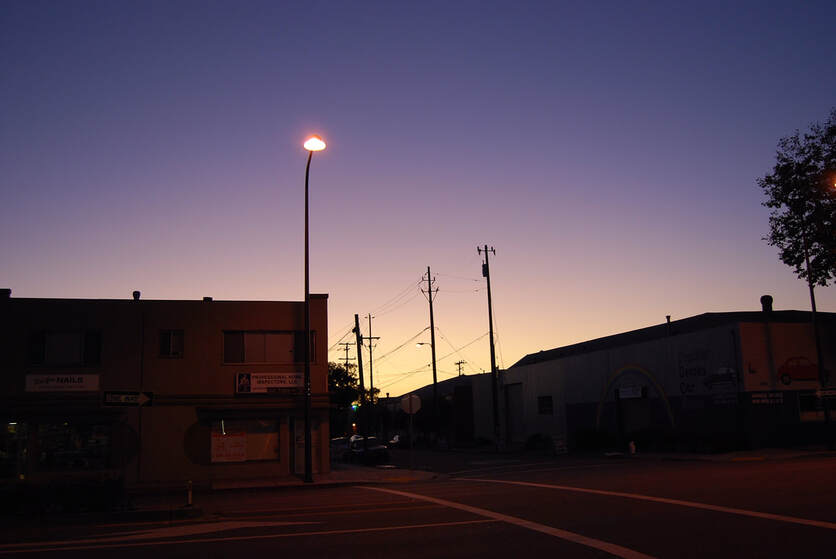|
Tex Batmart CC Given to rust I watched her for a while through the window before I went out back. I was about to leave anyway. I normally didn’t even stay this long. Neither of us were comfortable around one another after a certain amount of time. Hey mom, I said. I know she heard me, but she didn’t stop spray painting the trees. What are you doing? Could you pass me the hammered-copper one? This is about out, she said, and then shook the paint can. The ball inside made a hollow, wet sound like a jaw breaker clacking against a filling. All the trees were painted in metallic colors: polished silver, icy black, sun-warmed gold. She hadn’t been able to reach the branches except for the lowest. I passed her the can she’d asked for and her hands gleamed with splatter. You really should stop, I said. I didn’t know what the paint would do to the trees, if anything, but the sun was setting and she’d been out all afternoon in the late summer sun. We had an ornamental pear tree back here when we bought this house, she said. Beautiful blooms. Fruit too. Humans can’t eat it of course. But the birds. Sometimes the whole backyard looked like it was about to burst into flight. Wings everywhere poised, like a ruffled sea. She spayed a couple thin spots. The trunk in front of her looked like it had been dipped in molten copper. I plucked a leaf from a branch above my head and studied it. I had no idea what type of tree it was, but its veins were thick and steady. But then it got sick. A virus or something. Something we couldn’t see or do anything about. It died. Your father cut it down, tore out the stump replaced the dirt, covered it with sod. Now no one remembers the ornamental pear tree was even here, that it was beautiful and brought beauty. Even if we couldn’t eat the fruit. There’s not a day that goes by that I don’t wish we had preserved it somehow. Let it be. Covered it in something that would have made it last. She moved to the last tree, a solitary aspen meant as the first of a small grove. Do you remember? she asked without looking at me. I guessed she didn’t want to see the lie on my face when I said yes. I watched her work again. Then I dug around in the Home Depot bag and found a can with the color Bronze Sky. I started with the bushes and moved on to the lawn. Once the everything was painted, or it had become too dark to tell what wasn’t, we sat down by where she said the ornamental pear had once grown, and smoked. She liked Pall Mall 100’s, which I hated but I was out. We hadn’t turned on the back-patio lights so I could only see the outline of her facial features; all hard angles and shadow, a tightness I had forgotten about. It seemed I only remembered her properly when she was right there in front of me. She didn’t tell me what was going on. I knew I could guess but she would never say, an attempt to spare me I’m sure. She worried that I couldn’t handle anymore stressors. The moon hid that night so we couldn’t see our work except for the glimmer of reflected stars in the foliage, but, for her at least, it was enough to know it was done. Whatever it was that needed preserving was varnished in metal. My own hands were darkly speckled. It seemed like a sign, a premonition. I left her there, sitting outside and chain-smoking. It should have been hard to do. I went to a spot over on Broadway where I knew they would serve me. The kind of place that didn’t make you pay before they gave you a drink. A beer and two shots in, and I was myself, the version I knew and hated the most. I could have jumped up and kissed the ceiling. An older man with eyes like the sky made a comment about the paint on my hands; asked if I was an artist. I told him I had jerked off the Tin Man. He ordered us a pitcher. Later, I was in the back of someone’s car. I noticed I had a pack of Camel’s, my favorite, and a Zippo lighter, just plain silver but it shone like someone loved it. I rolled down the window and the road beside me passed in a slick blur. I ignored whatever was happening beside me inside the car. There were hands and faces and heat but it didn’t really matter. We were passing the largest lake I had ever seen, so big it probably was something else. The far shore was lined with trees and the sun was rising behind them, illuminating every single leaf. From a hundred, maybe thousand yards away, I could see each one, and though I’ll never forget it, I couldn’t have told you what color they were.  Evan James Sheldon's work has appeared recently in the Cincinnati Review, Ghost Parachute, and Litro. He is a Senior Editor for F(r)iction and the Editorial Director for Brink Literacy Project. You can find him online at evanjamessheldon.com.
0 Comments
Your comment will be posted after it is approved.
Leave a Reply. |
AuthorWrite something about yourself. No need to be fancy, just an overview. Archives
April 2024
Categories |

 RSS Feed
RSS Feed
